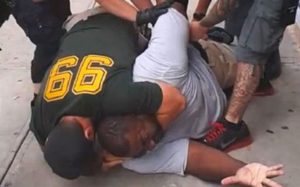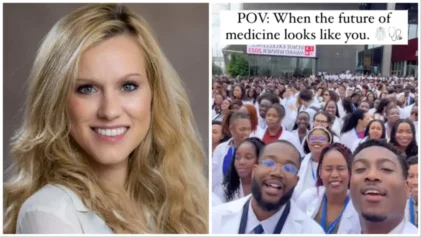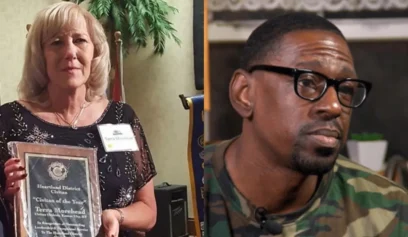
Eric Garner being choked to death by New York City Police in July 2014.
Days after New York City police officers choked an unarmed Black man to death in the summer of 2014, ForHarriet.com founder and editor Kimberly Foster declared she would “not march for Eric Garner.” Foster described “watching Black men show up for Garner after seeing so many derail conversations about Black women’s well-being leaves me with little more than a sinking feeling of despair.”
The perception that sympathy and political mobilization are unequally reserved for Black males has been gaining traction for well over a decade in intellectual circles. Sociologist L’Heureux Lewis and others describe this as “Black male privilege.” Lewis and others don’t suggest Black males are on the brink or world domination, but they do posit that in relation to Black females, Black males often enjoy greater access to resources and/or attention to their accomplishments and grievances. Speaking with journalist Michel Martin, Lewis, a Black man, explained, “There are actually spaces where Black men are advantaged and often sometimes dominate a dialogue,” often to the detriment of Black women.
In a 2016 report, Lewis corroborates the disparities that pained Foster, adding that when we seriously access the problems facing Black people, we “are most commonly raised and framed in terms of the crisis of Black males.” Using our framework of mass incarceration to demonstrate, Lewis observes Black males are the default representation of the prison’s consumption of Black bodies. This helps conceal the rising number Black female incarceration.
UCLA associate vice chancellor Devon Carbado adds Black LGBTQ groups to those ignored, writing, “Heterosexual Black men occupy a privileged victim status in ant-racist discourse.” Whether recounting the bravery of the civil rights movement or lauding former President Barack Obama’s My Brother’s Keeper initiative, the lens is often isolated on the feats and falterings of Black males. Like the late Tupac Shakur, having all eyes on the Black male constitutes part of the privilege generated by a patriarchal, male dominated planet.
Black male studies scholar Tommy Curry agrees that patriarchy is massive and a systemic problem. But he submits that that very system is designed to eradicate any kernel of privilege or power Black males imagine obtaining. His new book, “The Man-Not: Race, Class, Genre, And The Dilemmas of Black Manhood” explicitly opposes the notion that “Black men and boys” are automatic beneficiaries of male supremacy.
His thesis: “[the] white supremacist state… not only denies ‘manhood’ to Black men and boys but also imposes patriarchy on them as seemingly endless and unfettered violence.” Centuries of lynching and flagrant terrorism disproportionately targeting black males like Garner is intended to make certain Black males never mature to vie with white men – or white women – for power. Whether in economics or employment, Black males are prohibited from exercising male authority in aspect of their lives.
Curry submits that the gawking and attention to Black males, framed by some as “Black male privilege,” are often little more than dehumanizing stares at Black corpses. After the dying moments of Eric Garner and Philando Castile accumulate millions of views, Curry writes, “Black men are rarely thought of beyond their dead bodies.” Recognizing the humanity of Black males and seeing that no more Castiles or Garners meet the same fate has proven impossible.
The title of sociologist Becky Pettit’s 2012 book “Invisible Men: Mass Incarceration and the Myth of Black Progress” challenges multiple facets of the view that Black males hog the attention related to racism. Because the prison system is disproportionately Black and male, Pettit believes large numbers of Black males are unseen. If these ignored inmates were included in our overall assessment of African-American advances, Pettit senses celebrations of Black progress would be greatly muted. With more than two million U.S. inmates at the time of Obama’s 2008 election, Pettit writes turning a blind eye to this large population of Black males distorts “the establishment of social facts” and “conceals inequality.”
University of Buffalo legal scholar Athena Mutua concedes grappling with “the reality of Black male lives is complicated.” She’s extensively researched the notion of “Black male privilege” and the unique vulnerabilities Black males are susceptible to because of white supremacy. In her view, “Black men benefit from being men in a male dominated, male supremacist society.” In addition to the profuse attention on Black male suffering, Mutua suggests Black males are afforded economic advantages because of patriarchy. “Because society is male dominated and prefers the engagement in sports by men, there is lots of funding for professional male sports in contrast to women’s sports,” says Mutua.
This argument does not take into account that male athletes may get more attention because the male body has more muscle mass that allows for a higher level of athletic ability that people are willing to pay for.
Atlanta Black Star presented Mutua’s analysis to Curry for comment. “When it comes to Black men… they fill up the NBA. We sure love that entertainment. We love seeing Black men [like Floyd Mayweather] box each other and get brain damage. And they can’t speak by the time they’re in their 40s or 50s. But they sure have a lot of privilege right there,” responded Curry.
Curry’s response also leaves room for debate on the idea that rich Black athletes are only victims who suffer physical harm from their various sports. The privileged life of athletes certainly opens up opportunities that their poorer Black male brethren would look upon as having substantial benefits.
The attention on Black male victims like Garner and Castile reflects the disproportionate police violence and confinement Black males are subjected to. There is no structural apparatus that empowers Black males to successfully lobby for their interests, ensures their gainful employment, or protects and values their lives.
Curry asks: “If the effect of racism is such that the alleged advantages of men disappear in most of the things that we value, like work or life expectancy or home ownership, why make the leap” to insist Black males benefit from or exercise privilege?
Legions of Black males and a growing number of Black women are incarcerated because of white power, not Black privilege. Searching for “privileged” Black people can sidetrack Black males and females from producing the Black power needed to establish justice.
——————————————————————————————————Gus T. Renegade hosts “The Context of White Supremacy” radio program, a platform designed to dissect and counter racism. For nearly a decade, he has interviewed and studied authors, filmmakers and scholars from around the globe.


